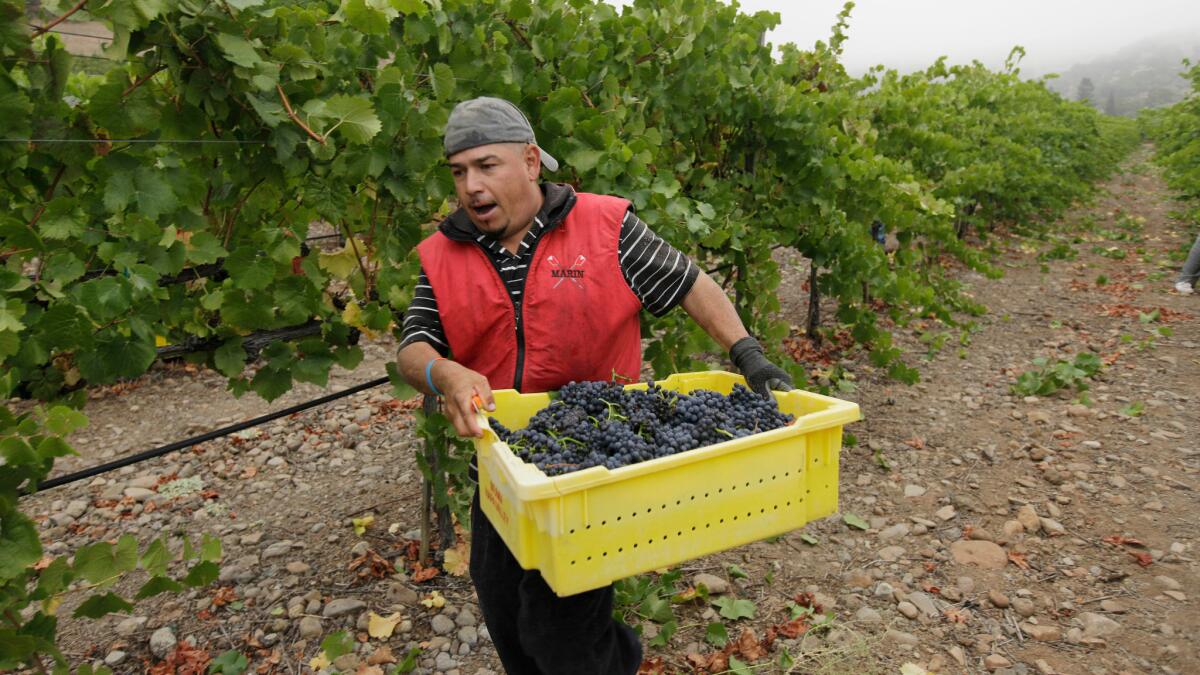Editorial: Overtime for farmworkers, a ban on elephant bullhooks and other bills that should become law in California

- Share via
It’s make or break time for proposed new state laws as the Legislature rushes to finish its latest two-year session and adjourn until December. To have a chance of becoming law, bills must be approved by both chambers before the end of the day Wednesday. Then there is still the formidable obstacle of Gov. Jerry Brown’s veto pen.
A number of bills that deserve to become law face an uncertain fate in the coming days. Here are a few of them.
There always seems to be at least one big end-of-session fight. This year it is over the bill to make overtime rules fairer for farmworkers.
Less generous rules for farmworkers are a legacy of the Depression-era laws that established minimum wage and overtime protections. Current law entitles them to overtime pay only after they work a longer day — 10 hours — than other employees, and allows agricultural employers to demand longer workweeks. The proposed new rules would gradually shorten the hours required before overtime pay kicks in until it reaches the standard eight-hour day by 2022, as well as phasing in a standard 40-hour workweek.
It sounds reasonable, right? But the bill failed earlier this year, as Assembly members representing agriculture-heavy districts balked at raising farmers’ costs. Helped by Senate allies, Assemblywoman Lorena Gonzalez (D-San Diego) resurrected the proposal in a bill that the Senate then passed. The measure now returns to the Assembly for a tough vote on Monday. Even lawmakers from farming districts should stop defending an unfair policy that treats farmworkers as a labor underclass.
A pilot program in three California counties, including Los Angeles, requires people who’ve been convicted of driving under the influence to equip their vehicles with devices that prevent the vehicles from starting if the devices detect alcohol on the driver’s breath. Since then, the roads have been safer. It’s time to make the program permanent and take it statewide, as SB 1046 would do. It has been passed by the Legislature, but it remains to be seen whether Brown will do the right thing and sign it.
This measure would protect hospital patients from being surprised with huge bills from doctors who aren’t part of their health insurer’s network. This bill, which has been resisted by some physician groups, would require out-of-network doctors to obtain a patient’s permission at least a day before providing non-emergency treatment at an in-network hospital or clinic. It’s a reasonable middle ground in the ongoing struggle between what insurers want to pay and what providers want to be paid. It still needs a floor vote in the Senate this week.
This hard-fought bill, which would ban back-channel communication with the California Coastal Commission as it considers development applications, would help restore faith in a board accused of being overly susceptible to developers’ influence. It temporarily stalled after it was amended in an Assembly committee earlier this month, and supporters initially feared that advocates of coastal development had gutted it. But it is back on track and needs a full vote of the Assembly this week.
Lifting the school reserve cap
This legislation has no bill number because it doesn’t actually exist yet. There was a bi-partisan bill earlier this year — SB 799 by Sen. Jerry Hill (D-San Mateo) — to increase the burdensome savings cap that prevents school district from setting aside adequate reserves for unforeseen expenses. Opposition from the California Teachers Assn., which argued that school districts had built excessive reserves to hide money that should have been spent in classrooms, helped kill the legislation in committee for the second time in two years. The two sides have been working on a compromise this summer, and legislative leaders ought to pressure them to strike one.
This measure would forbid the use of bullhooks on elephants. The cruel device, which resembles a fire poker, is used to pull, prod, or strike an elephant — or just brandished as a threat — while handling the animal. Such tactics have become unacceptable over the years, and no accredited California zoos allow bullhooks anymore.
Nevertheless, Brown vetoed a similar bill last year because he believed it unnecessarily created a new crime. This bill solves that problem by making use of the bullhook a violation of the Fish and Game Code.
Follow the Opinion section on Twitter @latimesopinion and Facebook
More to Read
A cure for the common opinion
Get thought-provoking perspectives with our weekly newsletter.
You may occasionally receive promotional content from the Los Angeles Times.










